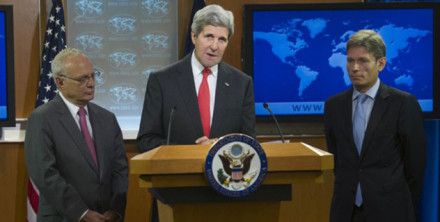 DHARAMSHALA: The Chinese government imposed severe repression on the religious freedom of Tibetans across Tibet, the US said in its 2013 International Religious Freedom Report.
DHARAMSHALA: The Chinese government imposed severe repression on the religious freedom of Tibetans across Tibet, the US said in its 2013 International Religious Freedom Report.
The report said the Chinese government’s respect for and protection of religious freedom in the Tibetan areas were poor, with widespread official interference in religious practice, especially in Tibetan Buddhist monasteries and nunneries.
Repression was severe and increased around politically sensitive events and religious anniversaries, the report said, adding that official interference in the practice of Tibetan Buddhist religious traditions continued to generate profound grievances.
“They (Chinese authorities) arrest Tibetan Buddhists simply for possessing the Dalai Lama’s photograph,” the Press Trust of India quoted US Secretary of State John Kerry told reporters after releasing the report.
There were reports of detention, sentencing (including two death sentences, one with a two-year reprieve), three deaths attributed to police, and other government-initiated violence related to religious issues. According to reports by journalists and non-governmental organizations (NGOs), 26 Tibetans, including monks, nuns, and laypersons, self-immolated, it said.
Tibetans face societal discrimination in employment, while engaging in business or when traveling, but because Tibetan Buddhists’ ethnic identity is closely linked with religion, it can be difficult to categorize incidents of intolerance as purely ethnic or religious, the report said.
“Tibetans, particularly those who wore traditional and religious attire, regularly reported incidents in which they were denied hotel rooms, avoided by taxis, and/or discriminated against in employment opportunities or business transactions,”it said.
“Many ethnic Han Buddhists were interested in Tibetan Buddhism and donated money to Tibetan monasteries and nunneries. Tibetan Buddhist monks frequently visited Chinese cities to provide religious instruction to ethnic Han Buddhists. In addition, a growing number of ethnic Han Buddhists visited Tibetan monasteries, although officials sometimes imposed restrictions that made it difficult for ethnic Han Buddhists to conduct long-term study at many monasteries in ethnic Tibetan areas,” the report said.
The report said “the US government repeatedly urged authorities at multiple levels to respect religious freedom for all faiths and to allow Tibetans to preserve, practice, teach, and develop their religious traditions. The US government raised individual cases and incidents with the Chinese government. US officials urged the Chinese government to engage in constructive dialogue with the Dalai Lama or his representatives, as well as to address the policies that threaten Tibet’s distinct religious, cultural, and linguistic identity; such policies are a primary cause of grievances among Tibetans.”
The report said the ability of US diplomatic personnel to speak openly with Tibetan residents and members of the monastic community was severely restricted during their visits to Tibet.
Secretary Kerry submitted the 2013 International Religious Freedom Report to the US Congress. Mandated by Congress, the International Religious Freedom Reports help inform US government policy and foreign assistance. They also serve as a reference for other governments, international institutions, non-governmental organisations, legal professionals, scholars, interested citizens, and journalists.
